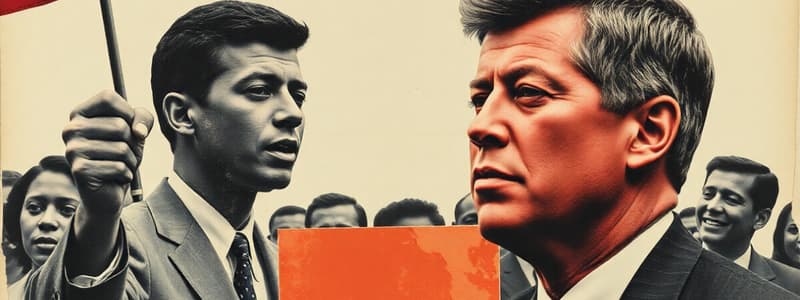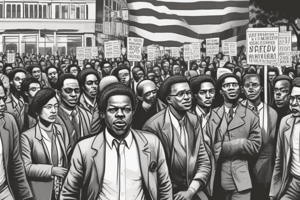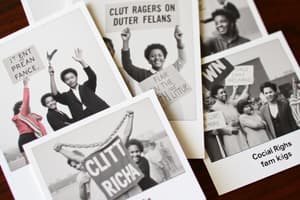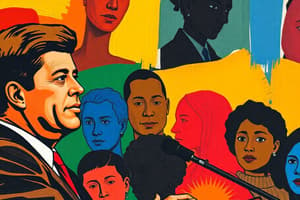Podcast
Questions and Answers
What legislation aimed to end segregation in public places and prohibit employment discrimination based on various factors?
What legislation aimed to end segregation in public places and prohibit employment discrimination based on various factors?
- Voting Rights Act
- Civil Rights Act (correct)
- Fair Housing Act
- Education Act
What significant act passed in 1965 eliminated literacy tests for voting?
What significant act passed in 1965 eliminated literacy tests for voting?
- Fair Housing Act
- Voting Rights Act (correct)
- Equal Employment Opportunity Act
- Civil Rights Act
Which act was passed shortly after the assassination of Martin Luther King Jr. to prevent housing discrimination?
Which act was passed shortly after the assassination of Martin Luther King Jr. to prevent housing discrimination?
- Civil Rights Act
- Voting Rights Act
- Fair Housing Act (correct)
- Equal Rights Amendment
What organization, founded in 1929, aimed to fight for the civil rights of Latinos in the United States?
What organization, founded in 1929, aimed to fight for the civil rights of Latinos in the United States?
Which historical event marked the beginning of the civil rights struggle that led to significant legal changes for various marginalized groups?
Which historical event marked the beginning of the civil rights struggle that led to significant legal changes for various marginalized groups?
What was the purpose of Executive Order 9981 issued by Harry Truman?
What was the purpose of Executive Order 9981 issued by Harry Truman?
Which strategy did JFK's administration use to address civil rights issues while managing Southern Democrats?
Which strategy did JFK's administration use to address civil rights issues while managing Southern Democrats?
Which event is associated with Martin Luther King Jr.'s efforts to draw attention to racial injustice in Birmingham?
Which event is associated with Martin Luther King Jr.'s efforts to draw attention to racial injustice in Birmingham?
What was the outcome of police actions against MLK's protests in Birmingham?
What was the outcome of police actions against MLK's protests in Birmingham?
In his televised speech, JFK described the civil rights issue primarily as what?
In his televised speech, JFK described the civil rights issue primarily as what?
What significant action did the JFK administration undertake just days after MLK's famous speech?
What significant action did the JFK administration undertake just days after MLK's famous speech?
What was a notable effect of MLK's 'I Have a Dream' speech at the Lincoln Memorial?
What was a notable effect of MLK's 'I Have a Dream' speech at the Lincoln Memorial?
How did Robert F. Kennedy contribute to the civil rights movement during JFK's administration?
How did Robert F. Kennedy contribute to the civil rights movement during JFK's administration?
Flashcards
Civil Rights Act of 1964
Civil Rights Act of 1964
Landmark legislation that ended segregation in public places and banned employment discrimination based on race, color, religion, sex, or national origin.
Voting Rights Act of 1965
Voting Rights Act of 1965
Legislation that outlawed discriminatory voting practices like literacy tests, enabling federal examiners to ensure fair elections.
Fair Housing Act of 1968
Fair Housing Act of 1968
Act preventing housing discrimination based on race, sex, national origin, and religion. Came after MLK's assassination.
Discrimination against Latin Americans
Discrimination against Latin Americans
Signup and view all the flashcards
LBJ signing Civil Rights Act
LBJ signing Civil Rights Act
Signup and view all the flashcards
Truman's Civil Rights Agenda
Truman's Civil Rights Agenda
Signup and view all the flashcards
JFK's Civil Rights Stance
JFK's Civil Rights Stance
Signup and view all the flashcards
Robert Kennedy's Role
Robert Kennedy's Role
Signup and view all the flashcards
Birmingham Protests
Birmingham Protests
Signup and view all the flashcards
Letter from Birmingham Jail
Letter from Birmingham Jail
Signup and view all the flashcards
JFK's Public Support
JFK's Public Support
Signup and view all the flashcards
Civil Rights Act Sponsorship
Civil Rights Act Sponsorship
Signup and view all the flashcards
March on Washington
March on Washington
Signup and view all the flashcards
Study Notes
Civil Rights Movement
- The Cold War spurred Harry Truman to initiate a civil rights agenda.
- Executive Order 9981 (1948) ended discrimination in the military.
- Grassroots initiatives emerged, advancing racial equality and fueling the civil rights movement.
1960 Presidential Campaign
- John F. Kennedy (JFK) presented himself as a champion of African American rights during his 1960 campaign.
- He highlighted African liberation struggles, promising federal action on education and housing, and attacking segregation in the South.
- Concerns arose that JFK, once elected, would downplay civil rights legislation due to opposition from Southern Democrats.
Initial Actions and Approaches
- The Kennedy administration prioritized executive action over congressional interventions to advance civil rights.
- Robert Kennedy (Attorney General) played a crucial role, working alongside civil rights groups like the Student Nonviolent Coordinating Committee (SNCC) to register disenfranchised African Americans.
Early Results and Challenges
- JFK's administration saw a five-fold increase in black voter registration within two years.
- However, challenges persisted with the FBI's reluctance to protect civil rights activists.
- The Attorney General (Robert Kennedy) had to encourage black voter registration to overcome FBI resistance.
- The Attorney General deployed hundreds of federal marshals to protect civil rights activists.
Birmingham Protests
- Martin Luther King Jr.'s (MLK) large-scale protests in Birmingham, Alabama, aimed at dismantling segregation laws.
- Sit-ins at lunch counters, marches on city halls, and boycotts of businesses were among the tactics utilized.
- The city's police commissioner, "Bull" Connor, employed harsh tactics against protestors, drawing national attention to the struggle.
- Police used dogs, high-pressure water hoses and made mass arrests.
- MLK wrote "Letter from a Birmingham Jail" during his stay at jail to highlight racial injustice issues.
Children's March
- Thousands of children participated in protests to challenge segregation laws.
- Authorities reacted with significant force including using dogs and water hoses against protestors.
Public Advocacy
- MLK used media appearances, including TV broadcasts, to advocate for racial justice.
- His public speeches underscored moral issues and principles embedded in both scripture and American documents.
Civil Rights Act (1963) and Further Legislation
- President Kennedy's administration initiated the Civil Rights Act.
- The law emphasized equal access to public accommodations and full voting rights.
- The Civil Rights Act of 1964 outlawed segregation in public places.
March on Washington
- A significant march on Washington by 200,000 people occurred to advocate for civil rights.
- Martin Luther King Jr. delivered his "I Have a Dream" speech advocating for equality and justice during the event.
Assassination and Legacy
- President John F. Kennedy was assassinated in Dallas in 1963.
- VP Lyndon Baines Johnson assumed presidency and furthered civil rights legislation as well.
Voting Rights Act (1965)
- The Voting Rights Act outlawed literacy tests and ensured federal oversight of elections.
Fair Housing Act (1968)
- The Fair Housing Act prevented discrimination in housing based on race, religion, sex, or national origin, enacted shortly after Martin Luther King Jr.'s assassination.
Further Civil Rights Struggles
- Malcolm X's advocacy for black nationalism and activism was evident.
- The assassinations of Martin Luther King Jr., and Robert Kennedy highlighted the persistence of racial tensions and inequalities in the US.
Latin American Civil Rights
- The US annexed Mexican territory following the Mexican-American War and promised full citizenship to Mexican Americans.
- Over decades, Latin Americans faced discrimination and segregation, prompting civil rights organizations like LULAC (League of United Latin American Citizens).
- Court cases challenged discriminatory practices.
- The civil rights movement for Latinos was a component of larger struggle for diverse social justice initiatives, and contributed to broader socio-political changes.
Conclusion
- The Civil Rights Movement brought systemic change regarding slavery but not all discrimination.
- The movement championed social justice for African Americans in the 1950s and 1960s, with similar movements later emerging for Latinos, women, LGBTQ+ communities and others.
Studying That Suits You
Use AI to generate personalized quizzes and flashcards to suit your learning preferences.




